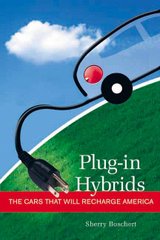By now, credible economists and scientists have debunked the myth that ethanol can play anything more than a small supporting role in the energy-security mission. Ethanol has less power per gallon than gasoline. It can be produced profitably only with fat subsidies. Making it from corn (the only current source in this country) consumes so much other resources that the net energy savings are, by some accounts, nonexistent.But IBD believes that the political juice of ethanol is distorting policy decisions.
There is a well-organized and influential ethanol lobby in this country, led by corn farmers, food processors such as Archer Daniels Midland Co. and politicians such as Grassley.Advocacy for plug-in cars is much less organized and underfunded. The utilities need to step up, declare the benefits of electricity in cars, and promote its product. And lobby as fearlessly as do Big Oil and Big Corn.
Hat tip to Felix Kramer of CalCars






